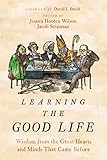Learning the Good Life: Wisdom from the Great Hearts and Minds That Came Before
Material type: TextPublication details: Grand Rapids, Michigan Zondervan Academic 2022Description: 300p 24 cmContent type:
TextPublication details: Grand Rapids, Michigan Zondervan Academic 2022Description: 300p 24 cmContent type: - text
- unmediated
- volume
- 9780310127963
- BC25 23/eng/20211020 W691
| Item type | Current library | Call number | Status | Date due | Barcode | |
|---|---|---|---|---|---|---|
 Books
Books
|
DVK Library Stack -> First Floor -> BC | BC25 W691 (Browse shelf(Opens below)) | Available | 22147180 |
Browsing DVK Library shelves, Shelving location: Stack -> First Floor -> BC Close shelf browser (Hides shelf browser)
| No cover image available |

|

|

|

|

|

|
||
| BC25 SC0832 The Way of Wisdom in the Old Testament | BC25 SCO832 The Way of Wisdom in the Old Testament | BC25 W524 Roots of Wisdom | BC25 W691 Learning the Good Life: Wisdom from the Great Hearts and Minds That Came Before | BC25 W775 Jesus the Sage: The Pilgrimage of Wisdom | BC25(BC27) T187 An Introduction to Wisdom Literature and the Psalms | BC25(C81) B674 The Wisdom of Creation / |
Includes bibliographical references.
Part 1: 450 BC to AD 600
1. Lao Tzu, From Tao Te Ching
Introduction by Paul J. Pastor
2. Confucius, From The Analects.
Introduction by Ravi Jain
3. Plato, "The Allegory of the Cave"
Introduction by Jason Baehr
4. Seneca the Younger, From "On the Shortness of Life".
Introduction by Matthew D. Wright
5. Athanasius, From On the Incarnation
Introduction by Adam J. Johnson
6. Gregory of Nazianzus, On My Own Verses
Introduction by Philip Irving Mitchell
7. Augustine of Hippo, From On the Teacher
Introduction by J. L. Aijian
8. Augustine of Hippo, From On Christian Doctrine, Book 1
Introduction by Helen Rhee
9. Gregory the Great, Life of Saint Benedict, Dialogues, Book 2
Introduction by John Skillen
Part 2: AD 600 to AD 1700
10. Dante Alighieri, Divine Comedy: Inferno 1.
Introduction by Jason M. Baxter
11. Nezahualcoyotl, "A Flower Song of Nezahualcoyotl"
Introduction by Timothy E. G. Bartel
12. Anonymous, "The Peace Prayer of Saint Francis"
Introduction by Tuan Hoang
13. Margery Kempe, From "The Book of Margery Kempe".
Introduction by Beth Allison Barr
14. William Shakespeare, From King Lear
Introduction by Julianne Sandberg
15. John Amos Comenius, From The Labyrinth of the World and the
Paradise of the Heart
Introduction by David I. Smith
16. George Herbert, Five Poems
Introduction by Jason Crawford
17. Matsuo Basho, Three Haiku Poems
Introduction by Timothy E. G. Bartel
and Blaise Pascal, From The Pensées
18. René Descartes, From Meditations on First Philosophy,
Introduction by Ravi Jain
19. Sor Juana Inés de la Cruz, "Respuesta a Sor Filotea de la Cruz?
Introduction by Theresa M. Kenney
20. John Milton, From Areopagitica
Introduction by Louis Markos
Part 3: AD 1700 to AD 1900
21. Jonathan Edwards, From "Personal Narrative"
Introduction by Jonathan Callis
22. Edmund Burke, From Reflections on the Revolution in France
Introduction by Benjamin Myers
23. Alfred Lord Tennyson, From "Ulysses".
Introduction by Scott H. Moore
24. Frederick Douglass, From Narrative of the Life of Frederick Douglass,
an American Slave
Introduction by H. Collin Messer
25. Elizabeth Barrett Browning, From Aurora Leigh.
Introduction by Lanta Davis
26. Henry David Thoreau, From "Life without Principle"
Introduction by Jeffrey Bilbro
27. Gerard Manley Hopkins, "As Kingfishers Catch Fire"
Introduction by Jennifer L. Holberg
28. Jarena Lee, From Religious Experience.
Introduction by Patricia Brown
29. Friedrich Nietzsche, From Use and Abuse of History
Introduction by Scott Huelin
30. Anna Julia Cooper, From Womanhood: A Vital Element in the
Part 4: AD 1900 to Present Day
31. W. E. B. DuBois, From The Souls of Black Folk
Introduction by Angel Adams Parham
32. Virginia Woolf, From A Room of One's Own.
Introduction by Bethany Williamson
33. G. K. Chesterton, "Modern Elfland"
Introduction by J. Cameron Moore
34. T. S. Eliot, "Preludes".
Introduction by Joy Moore
35. C. S. Lewis, "Learning in War-Time"
Introduction by J. Cameron Moore
36. Dietrich Bonhoeffer, From Life Together.
Introduction by David I. Smith
37. Simone Weil, "Reflections on the Right Use of School Studies
Introduction by Paul J. Contino
38. Dorothy L. Sayers, From "The Lost Tools of Learning".
Introduction by Gina Dalfonzo
39. Flannery O'Connor, "The Enduring Chill"
Introduction by Julianna Leachman
40. Josef Pieper, From Leisure: The Basis of Culture and
Introduction by Jay Beavers
41. David Foster Wallace, "This Is Water".
Introduction by Rick Ostrander
42. Marilynne Robinson, From "Reclaiming a Sense of the Sacred".
Introduction by Brent Newsom
"What is "the Good Life"? How can we live well and fully in the world? Learning the Good Life seeks to help readers answer these age-old questions through introducing them to timeless texts from some of history's wisest hearts and minds. In doing so it offers a broader, richer, and more cohesive narrative in which Christians may participate"-- Provided by publisher.
There are no comments on this title.
